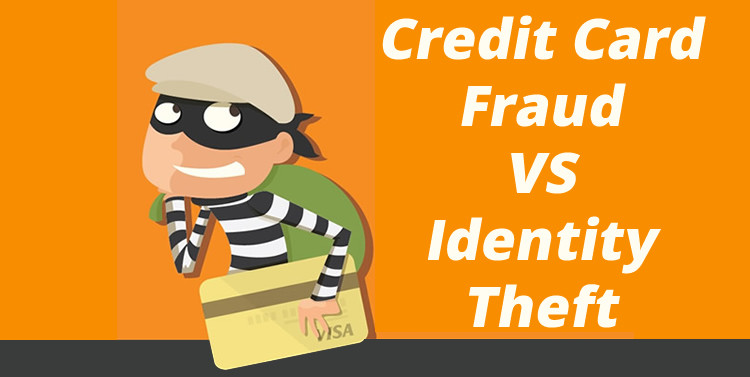Identity Theft vs Credit Card Fraud: What Are They and How to Protect Yourself

Identity theft and credit card fraud have devastating outcomes if you’re the victim. However, many consumers don’t know the difference between the two crimes. This guide defines what identity theft and credit card fraud are and how you can protect yourself from damages.
What is Identity Theft?
Identity theft occurs when someone uses your identifying information, such as your name, address, Social Security number, or bank account number, without your knowledge to to open accounts, commit fraud or crimes.
What is Credit Card Fraud?
Credit card fraud occurs when an individual is using someone else’s credit card or card account number is used without the cardholder’s authorization to make fraudulent transactions or withdraw funds. The most common credit card frauds are a stolen purse or wallet that contains the credit card or the card number is stolen during an electronic or online transaction.
The Differences between Identity Theft and Credit Card Fraud
Identity theft and credit card fraud are similar in that both crimes involve someone assuming another individual’s identity for personal gain, and both can seriously damage the victim’s credit history. How they differ, though, is that credit card fraud generally only involves a single credit account and the thief drains the account’s funds. In the case of identity theft, the thief can open multiple lines of credit in your name.
If your credit card is from a major card issuer, your card’s network has credit card fraud detection measures in place, and every transaction made with the card is assessed. If anything looks suspicious or out-of-place to the card issuer, the company will likely contact you before you notice the suspicious activity yourself.
You should still be diligent about monitoring your account activity. Regularly check your annual credit report, keep a close eye on your bank account and statements, and make sure you’re still receiving your valid bills in the mail.
Is credit card fraud a felony?
There are different penalties for credit card fraud in each state. States have their own guidelines to determine if a case of credit card fraud is considered a minor offense, misdemeanor or felony. Usual factors are the thief’s criminal background history, who the victim was, and how much was charged to the credit account.
How to Protect Yourself from Identity Theft and Credit Card Fraud
- Know the signs of identity theft.
- Monitor the transactions in your account history and credit reports.
- Be aware of credit card skimmers at ATMs or gas pumps.
- Don’t click links in suspicious emails, texts or websites that are claiming to be your bank, credit card company, or any other financial institution. Likewise, don’t give out personal details on these mediums or through a phone call. No legitimate organization would ask for your PIN number, SSN or other sensitive information.
How to Report Credit Card Fraud
If your credit card has been stolen or your account has unfamiliar transactions listed, contact your card issuer and bank immediately. The charges should be able to be reversed. Cancel your card and request a new one. Under Federal Trade Commission (FTC) and network agreements, you are not liable for charges you did not authorize.
How to Report Identity Theft
If you’re the victim of identity theft, contact the credit bureaus and place a “fraud alert” on your accounts. Dispute any errors that may appear as a result of identity theft on your credit report. You should also file a report with the FTC and local police station.
Does your credit report have errors because of identity theft or fraud?
If you’re the victim of identity theft, there may be errors on your credit report. Examples of an error from identity theft can be new accounts listed in your name that you did not open.
Under the Fair Credit Reporting Act (FCRA), you are entitled to a free copy of your credit report once every 12 months. If you notice a mistake on your credit report, you have the right to dispute the error and have it corrected or removed.
If these errors are not fixed after you have disputed them, you can sue the credit bureau or reporting agency. Contact the consumer law firm of Francis Mailman Soumilas, P.C. today to get your free case review or call toll-free at 1-877-735-8600.
